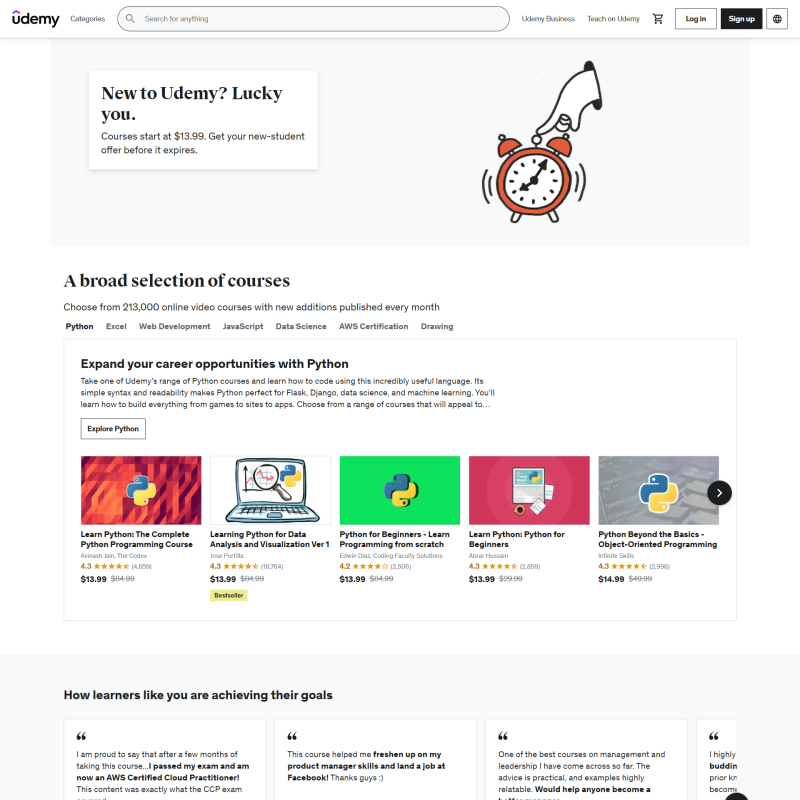The online learning market has seen significant growth in recent years, with a wide range of platforms offering a variety of courses and programs. Three popular platforms in the market are UpGrad, Coursera, and Udemy, but with so many options available, it can be difficult to choose the best platform for your learning needs. In this article, we will compare UpGrad, Udemy, and Coursera, to help you make an informed decision about which platform is best for you.
UpGrad vs Udemy vs Coursera: A Little About Each Platform
What We'll Cover
UpGrad
Golden Gate University
Doctor of Business Administration in Emerging Technologies Specialisation in Generative AI
36 Months
Specialize in Generative AI
UpGrad is an online learning platform that provides postgraduate and professional programs in areas such as data science, management, and technology. The platform is designed for professionals who want to upgrade their skills and advance their careers.
Udemy

Udemy is an online learning platform that offers a wide range of courses, covering a variety of subjects, including technology, design, marketing, and more. Udemy courses are created by individuals and can be taken at any time, making it a flexible and accessible option for learning.
Coursera

Start, switch, or advance your career with more than 5,800 courses, Professional Certificates, and degrees from world-class universities and companies.
Coursera is an online learning platform that partners with top universities and organizations to offer courses and programs in a wide range of subjects, including computer science, business, and arts. Coursera courses are designed by experts and offer a comprehensive learning experience.
Let's Compare their Features

UpGrad
- Mentorship: UpGrad provides dedicated mentors to students, who guide them through their learning journey and provide support and feedback.
- Career Services: UpGrad provides career services, such as resume building, interview preparation, and job placement assistance, to help students transition into their desired careers.
- Collaborative Learning: UpGrad's programs are designed to be collaborative, with opportunities for students to engage in group discussions, peer evaluations, and project work.
- Dedicated Mentorship: UpGrad's dedicated mentors provide students with personalized support and guidance, helping them stay motivated and on track
- Career Services: The career services offered by UpGrad help students transition into their desired careers and increase their chances of success
- Quality Curriculum: UpGrad's programs are designed and delivered by industry experts, ensuring the curriculum is up-to-date and relevant
- Cost: UpGrad's programs can be more expensive compared to other online learning platforms, making it less accessible to a wider audience
- Rigid Structure: UpGrad's programs have a set curriculum and timeline, which may not be suitable for individuals who prefer a more flexible learning experience
Udemy
- Wide Range of Courses: Udemy offers a wide range of courses, covering a variety of subjects, making it easy to find a course that matches your interests and learning needs.
- Affordable Prices: Udemy courses are often significantly more affordable than traditional classroom courses, making them accessible to a wider audience.
- Flexible Learning: Udemy courses can be taken at any time, making it easy to fit learning into your schedule.
- Affordable Prices: Udemy's courses are more affordable compared to traditional classroom courses, making education more accessible
- Wide Range of Courses: Udemy offers a wide range of courses, making it easy to find a course that matches your interests and learning needs
- Flexible Learning: Udemy's flexible learning options make it easy to fit learning into your schedule
- Inconsistent Course Quality: Since Udemy courses are created by individuals, the quality of the courses may vary, and some may not be as comprehensive or well-structured as others
- Limited Support: Udemy does not provide dedicated support or mentorship, which can be a disadvantage for students who need assistance in their learning journey
Coursera
- Top Universities and Organizations: Coursera partners with top universities and organizations, such as the University of Illinois and IBM, to offer high-quality courses and programs.
- Specializations and Degrees: Coursera offers both individual courses and multi-course specializations, as well as online degrees, making it a comprehensive platform for learners.
- Hands-On Learning: Coursera's courses often include hands-on projects and real-world case studies, helping students apply their learning in a practical way.
- Quality Curriculum: Coursera's courses are designed by experts, ensuring that the curriculum is comprehensive and up-to-date
- Comprehensive Learning: Coursera's specializations and online degrees offer a comprehensive learning experience, making it an ideal platform for individuals looking to upgrade their skills
- Hands-On Learning: Coursera's hands-on projects and real-world case studies help students apply their learning in a practical way
- Cost: Coursera's courses and programs can be more expensive compared to other online learning platforms, making it less accessible to a wider audience
- Rigid Structure: Coursera's courses have a set curriculum and timeline, which may not be suitable for individuals who prefer a more flexible learning experience
The Bottom Line

In conclusion, UpGrad, Udemy, and Coursera each have their own unique features and benefits, making them suitable for different types of learners. UpGrad is ideal for professionals looking to upgrade their skills and advance their careers, Udemy is a great option for individuals who are looking for affordable and flexible learning, and Coursera is ideal for individuals looking for a comprehensive and high-quality learning experience. Ultimately, the best platform for you will depend on your individual learning needs, goals, and preferences.
The responses below are not provided, commissioned, reviewed, approved, or otherwise endorsed by any financial entity or advertiser. It is not the advertiser’s responsibility to ensure all posts and/or questions are answered.









